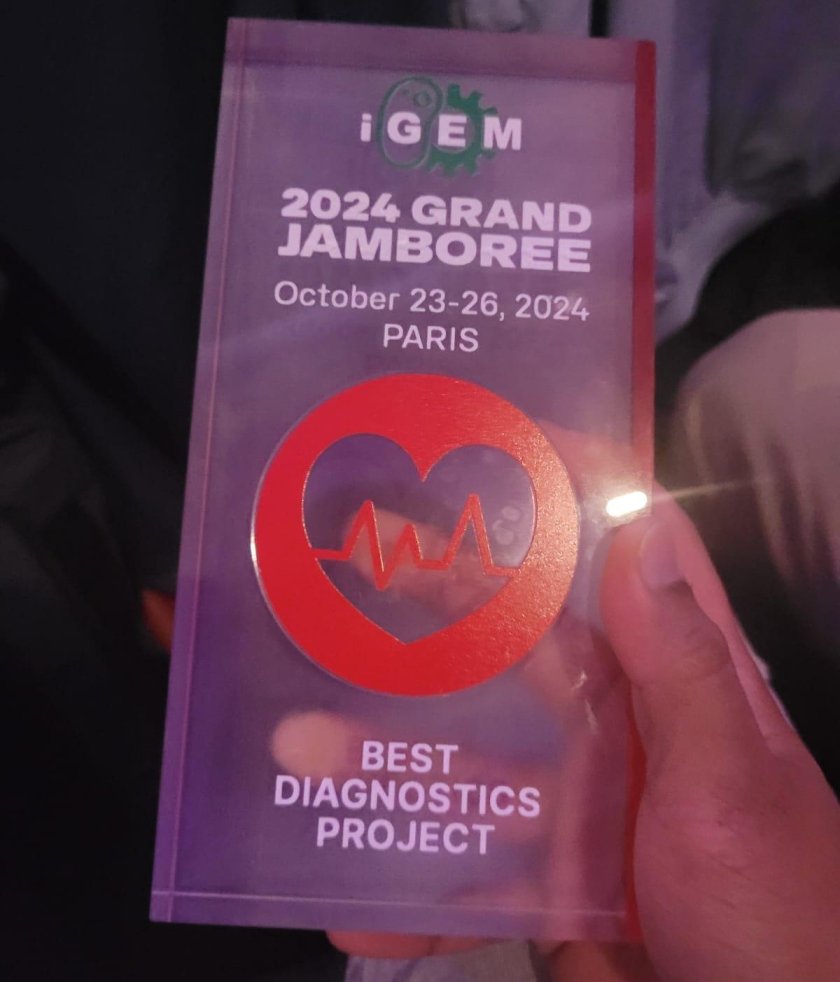
category_news
Wageningen students win award for diagnostic test multiple sclerosis
A team of Wageningen students has won the award for Best Diagnostic Project at the international iGEM student competition with their accessible test for multiple sclerosis. They were also nominated for four additional awards. The iGEM jury announced the results during the finals on 26 October in Paris.
The iGEM team from Wageningen University & Research, miRADAR, ranked among the top ten of the 75 participating master’s teams based on their overall score. In addition to their award for Best Diagnostic Project, the team received a gold medal, awarded to teams that achieve the highest scores across all competition criteria. The jury also nominated them for Best Part Collection, Best Mathematical Model, Best Presentation, and Best Website. The latter includes an overview of the entire project, the results, and the project’s societal elements.
Paper-based test

Currently, there are no specific tests for the chronic disease multiple sclerosis (MS), a condition in which the immune system causes inflammation in the central nervous system. This led the Wageningen students to develop a seemingly simple test made from a piece of paper. To use the test, doctors collect a blood sample from a patient, purify it, and treat it in a medical laboratory. They then add some droplets onto the paper-based test. Does the paper change colour from yellow to purple? Then the patient likely has MS. While the test is not yet ready for clinical use, the students have started its development to enable doctors to diagnose MS more easily, quickly, and at an earlier stage of the disease.
Of course, the piece of paper is no ordinary paper. It contains dried molecular biological substances. The test works by detecting small genetic molecules in the blood called microRNAs. Everyone has these kind of molecules in their blood, but the levels and ratios of different microRNAs vary. With the help of machine learning, the students found a pattern of microRNAs associated with people who have MS. The microscopic substances in the paper detect these microRNAs. Once detected, a reaction triggers the colour change, allowing an easy interpretation of the result.
iGEM
Recently, the Nobel Prize in Medicine was awarded to the discoverers of microRNAs. The iGEM team became interested in researching these small RNA molecules and their relationship with MS. They were able to realise their idea for this new test during the iGEM competition. This international competition offers students the opportunity to tackle a large scientific project and share their findings with each other. “I’m incredibly proud of what we’ve achieved as a team,” says team leader Marieke Koerhuis. “We combined very interesting methods from synthetic biology and incorporated feedback from doctors, researchers, and patient organisations into our project to make our idea practically applicable.”
The team has worked extremely well together and supported each other throughout the past year. I’m delighted with the way the students have merged individual projects into a single story that could have a huge impact on society.
The topics among the in total 400 competing teams vary widely, but all centre around synthetic biology. This field of science reprogrammes cells or microorganisms to produce useful substances, eliminate unwanted substances or cells, or detect molecules. It provides an opportunity to address social, environmental, or medical problems, and the iGEM competition encourages students to use their creativity to do just that.
“I’m impressed by how this team has set up new techniques in our lab in such a short time and made significant strides towards a new diagnostic test,” says Nico Claassens, team coordinator for miRADAR. Co-coordinator Robert Smith adds, “The team has worked extremely well together and supported each other throughout the past year. I’m delighted with the way the students have merged individual projects into a single story that could have a huge impact on society.”
Handing over the baton
The iGEM team from Wageningen University & Research consists of thirteen students with various specialisations in microbiology and synthetic biology. They are supported by scientists from the departments of Microbiology, Systems and Synthetic Biology, and Bioprocess Engineering.
Even after the finals, the team will continue documenting and further developing their project. In January, they will pass the torch to a new team of Wageningen students, who will once again design a project to make the world a healthier, better, or safer place with the help of synthetic biology.